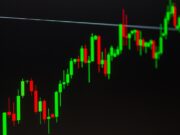Market noise is relentless. Financial headlines scream about the same handful of stocks while important opportunities—the kind that can meaningfully impact your portfolio—often fly completely under the radar.
That’s exactly why we publish this watchlist each week.
While most investors are distracted by mainstream narratives, we’re digging through earnings transcripts, analyzing technical setups, and monitoring institutional money flows to identify companies at potential inflection points. Our focus isn’t on what’s already priced in, but rather on what the market hasn’t fully appreciated yet.
Each week, we spotlight three stocks that merit your attention. We focus on opportunities where timing, valuation, and catalysts align to create potentially favorable entry points.
Our rigorous analysis goes beyond surface-level metrics to identify opportunities that most retail investors don’t have time to uncover. Each pick comes with clear reasoning, specific triggers to watch for, and a compelling risk-reward profile designed to help you make more informed investment decisions.
Here’s what caught our eye this week:
Dollar Tree (DLTR)
Dollar Tree has staged an impressive recovery, with shares surging over 60% since mid-March as the company successfully addresses its operational challenges and strategic missteps. Trading at around $99 per share, the discount retailer is approaching its 52-week high following the announcement of its Family Dollar divestiture and the rollout of its transformative 3.0 store format. What makes Dollar Tree particularly compelling at current levels is its strategic transformation away from the single-price model that made it famous, embracing a multi-price structure with products ranging up to $7 while maintaining its core value proposition for budget-conscious consumers.
The company’s willingness to evolve its business model demonstrates management’s adaptability in a challenging retail environment. The 3.0 format features wider aisles, better signage, and tiered pricing that allows Dollar Tree to expand its product offerings and attract customers at higher price points. With approximately 3,400 stores already converted and plans to have half of its 9,000+ locations in the new format by year-end 2025, the company is seeing early validation with same-store sales growing 5.4% in Q1 2025. The divestiture of Family Dollar for just over $1 billion removes a significant drag on performance and allows management to focus on its core strengths.
From a valuation perspective, Dollar Tree appears attractively priced despite its recent gains, trading at 19.7 times trailing earnings and 18.3 times forward earnings with a low price-to-sales ratio of 1.2. The company raised its full-year earnings guidance to $5.15-$5.65 per share while maintaining revenue guidance of $18.5-$19.1 billion, reflecting management’s confidence in the transformation strategy. For investors seeking exposure to defensive retail with a clear turnaround story, Dollar Tree’s combination of strategic repositioning, attractive valuation, and improving operational metrics creates a compelling investment opportunity as the company positions itself for sustained growth beyond the single-price point limitations that previously constrained its potential.
Sirius XM (SIRI)
Sirius XM presents a compelling value opportunity backed by Warren Buffett’s increasing conviction, with Berkshire Hathaway accumulating shares to reach over 35% ownership while the stock trades at deeply discounted levels. Trading at around $23 per share, the satellite radio provider offers an attractive 4.8% dividend yield and trades at just 7.7 times forward earnings despite generating consistent free cash flow exceeding $1 billion annually. What makes Sirius XM particularly intriguing is Berkshire Hathaway’s continued accumulation over the past eight months, representing Buffett’s final major investment decision before his announced retirement and suggesting significant confidence in the company’s turnaround potential.
While satellite radio faces secular headwinds from younger consumers preferring podcasts and streaming services, the company maintains several defensive characteristics that support its investment thesis. Sirius XM serves 33 million accounts representing approximately 70 million listeners, with a monthly churn rate of 1.6% remaining within historical ranges, indicating that existing customers value the service. The company has demonstrated disciplined capital allocation by reducing its share count by 48% since 2013 and consistently increasing its dividend for eight consecutive years, returning substantial value to shareholders even during challenging periods.
Several catalysts could drive a business turnaround and stock recovery. The return to office work should increase commuter demand for seamless entertainment, while lower gas prices remove inflationary pressure on driving behavior. Additionally, the aging U.S. vehicle fleet (averaging 14 years) creates pent-up demand for new car sales that would naturally expand Sirius XM’s addressable market. The company is also investing in content diversification through popular podcaster acquisitions, with podcast advertising revenue already growing 33% in the latest quarter. For value investors seeking a high-yield, deeply discounted stock with Buffett’s endorsement and multiple potential catalysts, Sirius XM offers an asymmetric risk-reward profile at current levels.
Nebius Group (NBIS)
Nebius Group has captured significant investor attention with shares surging nearly 150% since mid-April as the AI infrastructure specialist demonstrates execution on its ambitious growth plans. Trading at around $52 per share with a $12 billion market capitalization, the Amsterdam-based hyperscaler has emerged as a formidable competitor in cloud computing services, competing directly with industry giants like Amazon Web Services, Microsoft Azure, and Google Cloud. What makes Nebius particularly compelling is its strategic partnership with Nvidia, which not only participated in a $700 million funding round but also owns over 1 million shares, validating Nebius’s technology and market positioning in the critical AI infrastructure space.
The company’s diversified approach across four AI ecosystem segments provides multiple growth vectors beyond its core cloud infrastructure business. Nebius offers unique capabilities through its Toloka data partnership platform for testing large language models, TripleTen’s AI-driven educational reskilling platform, and Avride’s autonomous driving technology development. This comprehensive AI ecosystem approach, combined with exclusive access to Nvidia’s GB200 Blackwell Superchips for European customers, positions Nebius to capitalize on the rapidly expanding demand for AI computational resources across multiple industries and geographies.
Management’s aggressive growth projections appear increasingly achievable, with revenue run-rate targets of $750 million to $1 billion by year-end 2025 and expected positive adjusted EBITDA achievement this year. Even at current elevated prices, Nebius trades at approximately 12.5 times the upper end of its revenue guidance – a reasonable valuation compared to peer CoreWeave’s 15x price-to-sales ratio. The company’s transformation from its Russian search engine origins to a leading AI infrastructure provider demonstrates management’s ability to adapt and capitalize on emerging technology trends. For growth investors seeking exposure to the AI infrastructure buildout with a company backed by Nvidia’s strategic partnership, Nebius offers substantial upside potential as artificial intelligence adoption accelerates globally.






